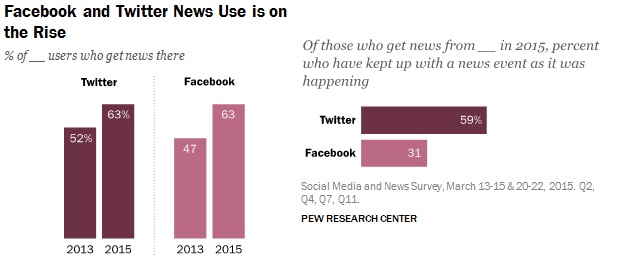Nearly two-thirds (63%) of Twitter and Facebook users in the US social are getting their news from these services, according to new research.
The Pew Research Center study of more than 2,000 Americans found that for both social networks, 63% of users surveyed said they were getting news there – up from 52% for Twitter and 47% for Facebook in 2013.
With 66% of US adults currently using Facebook and 17% using Twitter, that indicates that one in 10 Americans are getting news from Twitter, while four in 10 are getting it from Facebook.
These changes can be tied to many factors including personal behavior, increased activity by news organisations, as well as changes in the platforms’ filtering algorithms or content structures,” claimed the report’s authors.
They added that the trend cuts across demographics including gender, race, age, education and household income. “There was not, in other words, any one demographic driving the shift.”
Although both social networks have the same portion of users getting news on these sites, there are significant differences in their potential news distribution strengths.
The proportion of users who say they follow breaking news on Twitter, for example, is nearly twice as high as those who say they do so on Facebook (59% vs. 31%) – lending support, perhaps, to the view that Twitter’s great strength is providing as-it-happens coverage and commentary on live events.
On both platforms, entertainment is the most popular news category: 78% of Twitter news users and 74% of Facebook news users report regularly seeing posts about it on these services.
National government and politics (72% of Twitter news users and 61% of Facebook news users); sports (70% and 55% respectively); and local people and events (63% and 69%) are also popular topics.
“Roughly a quarter of both Facebook (28%) and Twitter (23%) news users at least sometimes post or tweet about news,” added the report, which also noted differences in the importance ascribed to the social networks as news sources, according to age.
49% of Twitter news users aged 18-34 say it’s the most or an important way they get news, versus 31% of people aged 35 and older. For Facebook, the respective percentages are 49% and 34%.
Among other key findings in the report:
– Twitter news users are more likely than their counterparts on Facebook to report seeing news about four out of 11 topics: national government and politics (72% vs. 61%), international affairs (63% vs. 51%), business (55% vs. 42%) and sports (70% vs. 55%). Twitter and Facebook news users are roughly comparable for the remaining seven topics covered: people and events in your community, local weather and traffic, entertainment, crime, local government, science and technology, and health and medicine. On Facebook, women are more likely to regularly see posts about health, entertainment and people and events in their community, while posts about weather, entertainment, crime, and health are more commonly seen by women on Twitter – a finding that is in line with our past research.
– The rise in the share of social media users getting news on Facebook or Twitter cuts across nearly every demographic group. Use of Twitter for news, for example, grew among both users under 35 (55% to 67%) and those ages 35 and older (47% to 59%). And on Facebook, news use grew among both men (44% to 61%) and women (49% to 65%). These data also reveal that news exposure is relatively equal within all demographic groups, with the exception of age. Though news usage among those under 35 increased at roughly the same rate as among those ages 35 and older, on Facebook, younger users are more likely to see news than older users.
– When it comes specifically to news and information about government and politics, Facebook users are more likely to post and respond to content, while Twitter users are more likely to follow news organizations.
About one-third of Facebook users (32%) say they post about government and politics on Facebook, and 28% comment on these types of posts. That compares to a quarter of Twitter users (25%) who tweet about this news topic and 13% who reply to tweets on this topic posted by others. But following news outlets directly is more common on Twitter.About half (46%) of Twitter users follow news organizations, reporters or commentators, compared with about three-in-ten (28%) of Facebook users.

